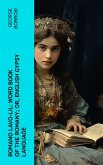In 'Romano Lavo-Lil: Word Book of the Romany; Or, English Gypsy Language', George Borrow embarks on a profound exploration of the Romani language and culture, providing an invaluable lexicon for understanding the rich linguistic tapestry of the Romany people. With meticulous attention to detail, Borrow employs an engagingly idiosyncratic style that blends folklore, ethnography, and linguistics, making the text both informative and accessible. This work is set against the backdrop of the 19th century, a time marked by increasing curiosity about marginalized cultures, positioning Borrow's scholarship as a pioneering effort in the representation of Gypsy language and identity in literature. George Borrow, an English writer and linguist born in 1803, developed a deep affinity for Romani culture during his travels across Europe, particularly spending time with Romani communities in England, Spain, and Romania. His experiences not only informed his linguistic pursuits but also fueled his passion for showcasing the dignity and complexity of the Romany people at a time when they were often misrepresented or misunderstood. Borrow's commitment to cultural preservation and examination of language is evident throughout his work. I highly recommend 'Romano Lavo-Lil' to scholars and enthusiasts of linguistics, cultural studies, and ethnography alike. This book not only serves as a crucial reference for the study of the Romani language but also invites readers to engage with the vibrant culture and rich history of the Romany people. Borrow's unique perspective and literary craftsmanship combine to make this work an essential addition to any serious library.
Dieser Download kann aus rechtlichen Gründen nur mit Rechnungsadresse in A, B, BG, CY, CZ, D, DK, EW, E, FIN, F, GR, H, IRL, I, LT, L, LR, M, NL, PL, P, R, S, SLO, SK ausgeliefert werden.









